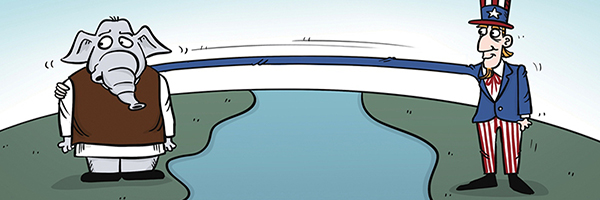India values ‘strategic independence’ over relying on US despite series of meetings with Quad members
 Zhang Hui, Global times, September 5, 2022 — Path to becoming developed country needs cooperation with China: analysts.
Zhang Hui, Global times, September 5, 2022 — Path to becoming developed country needs cooperation with China: analysts.India is holding a whirlwind series of meetings with its Quad partners this week, including Quad senior officers meeting with the US, Australia and Japan, and 2+2 meetings with the US and Japan separately, which was labeled by some media as New Delhi’s latest move to beef up support for Washington. However, Chinese observers said that unlike Japan and Australia, which have tied themselves tightly to the US’ anti-China chariot, India’s cooperation with the US is based on not undermining India’s strategic independence.
Chinese observers said that with India moving toward becoming a developed country as Prime Minister Narendra Modi pledged recently, it will value more its strategic independence rather than blindly following the US.
US Assistant Secretary of State for South and Central Asian Affairs Donald Lu is leading a US delegation to India from Monday to Thursday to deepen the US-India Comprehensive Global Strategic Partnership, during which Lu will be joined by Deputy Assistant Secretary of State for the Bureau of East Asian and Pacific Affairs Camille Dawson for a Quad Senior Officials Meeting and Department of Defense Assistant Secretary for Indo-Pacific Security Affairs Ely Ratner for a US-India 2+2 Intersessional Meeting and Maritime Security Dialogue, according to the US Department of State.
The Hindu reported that the Quad meeting was slated for Monday and Tuesday, and Indian External Affairs Minister Subrahmanyam Jaishankar and Defense Minister Rajnath Singh will also travel to Tokyo later in the week for an India-Japan “2+2” ministerial meeting. Indian Commerce Minister Piyush Goyal will travel to the US for bilateral trade talks and the third Indo-Pacific Economic Forum ministerial meeting (IPEF) in Los Angeles, the report said.
The report said India’s series of meetings with Quad partners was a “balancing” move ahead of the Shanghai Cooperation Organization summit in mid-September.
Chinese analysts acknowledged India’s increasingly important and unique role amid the current bloc confrontation, as the West strengthened its cozying up to India in order to contain China, while Russia maintained positive relations with India.
India sees the big powers’ game as an opportunity for its strategic rise. For example, some Indian people believe that the suppression of China by the US and the West is a very rare opportunity for India, Hu Shisheng, director of the Institute of South Asian Studies at the China Institutes of Contemporary International Relations, told the Global Times.
India’s cooperation with the US has not turned it against Russia, Zhao Gancheng, a research fellow at the Shanghai Institute for International Studies, told the Global Times.
India is the only member of the Quad that has not joined the US in sanctioning Russia or blaming it for the conflict with Ukraine, and Zhao believed that this Quad meeting is unlikely to see any “shocking” outcomes.
Indian media said the Quad meeting is expected to discuss bolstering food security and energy security initiatives.
In an interview with the Indian media outlet PTI, Russian Ambassador to India Denis Alipov recently criticized the US-led Indo-Pacific policy, saying it is part of a “containment policy,” but appreciated India’s position at the Quad for refusing to endorse its “divisive” statements.
Moreover, what makes India a fundamentally different member of the Quad is that it prioritizes its strategic independence rather than serving as a pawn of the US at the cost of giving up independence like Japan and Australia, analysts stressed.
India will never cooperate wholeheartedly with the US, and this is not just a strategic choice. India will cooperate with the US only when it is in its best interest to do so, Zhao said.
Now, India is concentrating on becoming a developed country by 2047, and it will attach more importance to strategic independence with growing economic strength, which may turn India into an important power for a multipolar world that weakens US hegemony, observers said.
Qian Feng, director of the Research Department at the National Strategic Institute of Tsinghua University, told the Global Times that on the reform of the international order, India hopes that Asian countries can play a more important role in the global political arena, so it understands that an all-out confrontation between China and India is definitely not in India’s interests.
Also, the economies of the US and the West are in relative decline. Therefore, if India wants to become a developed country, as Modi said, it needs to cooperate with the world’s second largest economy, Qian said.
